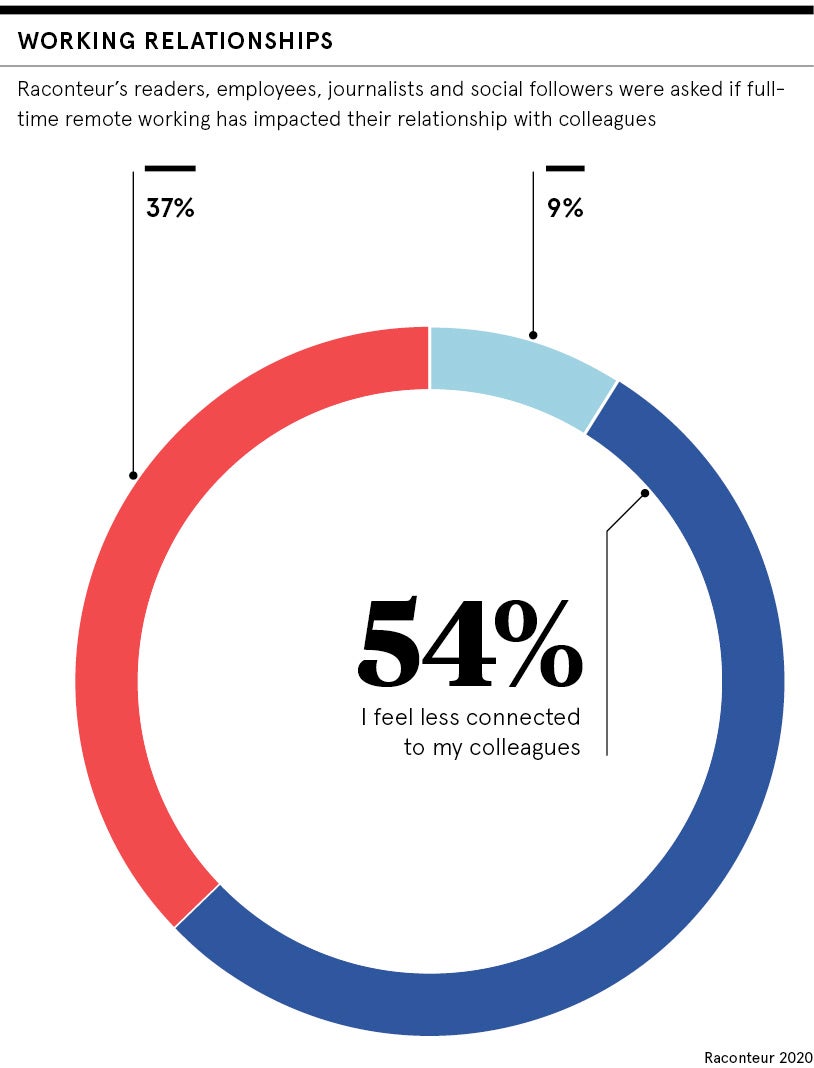In May, Twitter chief executive Jack Dorsey told his 4,000-plus global employees they had the option to work from home “forever”. It followed statements from fellow technology giants Google and Facebook that their international staff could work remotely until the end of 2020.
The Californian trendsetters aren’t alone. In a recent Institute of Directors (IoD) survey, four out of ten British business leaders said their organisation had made adjustments they intend to keep post-coronavirus lockdown.
Tej Parikh, chief economist at IoD, says: “Increased working from home is the most common action directors report they will maintain for the long run, followed by a greater use of digital platforms, both for operations and services.”
But what happens to the usual efforts to boost employee morale, from office snacks to drop-in masseuse sessions, now that millions of people are working from home? Can they expect virtual pints and a quiz overload or should leaders invest in ensuring company culture isn’t lost over patchy video calls?
The psychological impact of remote working
It’s a challenge Sir Cary Cooper, professor of organisational psychology and health at Manchester Business School, believes business leaders need to consider seriously. He says: “Group activities for bonding work groups are really important. You learn about other people and deal with them on a personal level, rather than just their roles. It’s difficult to maintain this in a lockdown scenario.”
The national trauma of COVID-19 may lead to some valuable shake-ups within traditional office structures. Zoom fatigue, whereby people are drained after a day of seeing their face on screen, is real.
You learn about other people and deal with them on a personal level, rather than just their roles
However, introduction to people’s home environments, through the keyhole of a laptop camera, may be having a positive impact. Sir Cary says: “We’re getting to know our colleagues better. We know more about their outside roles and what’s happening personally.”
Will this mean we’ll have more empathy and compassion for each other? It’s something Sir Cary will be keeping a close eye on. He believes the trend towards more remote and flexible working is positive, but teams still need face-to-face contact; the future of the office is a central location that supports employees’ social needs. “We can Zoom, Skype or chat using social platforms, but it’s not the same as speaking eyeball to eyeball or doing things jointly,” he says.
From meditation to merlot: virtual team bonding exercises
Globally, there’s been a boom in recreating the after-work social experience. In Japan, at-home video boozing sessions are on the rise. Japandemic Co, a brewery in Matsuyama, western Japan, has organised digital drinking parties with great success. In the UK, The Wine List founder Josh Lachkovic has experienced a spike in demand for at-home wine tastings. Interest from startups and corporates means the company has a packed weekly schedule and Lachkovic has had to hire a team of remote tasters to accommodate all the bookings.
He says it’s a fantastic way of breaking the ice. The Wine List team only knows the role of the person who books the session, so “everyone is equal”. He enjoys busting wine myths, including “Aren’t screwtops all bad?” (answer: no), as people tend to get very animated.
All In Good Time, a musical workshop that pre-COVID-19 would go into offices armed with ukuleles and microphones, has also successfully transitioned its model online and experienced a surge in interest. Founder Jason Tebble and facilitator Fred Claridge, both session musicians, run hour-long online choir exercises.

The aim, Tebble says, is to create a psychologically safe environment, encourage risks by getting participants to sing solos and solidify the team bond. He adds: “There is a lot we take for granted working in the same space in terms of feeling connected. It’s a real challenge to recreate when we’re all in our own homes.”
Grace McGeehan, founder of Graceful Mind and Body, who normally travels to clients’ offices for group or individual sessions, has been giving yoga classes and therapy sessions via Skype or Zoom. Clients have told her they really appreciate employers investing in their wellness, especially during these testing times.
Teams and a sense of belonging
Sir Cary is concerned about a new-generation workforce who may struggle to feel integrated. He is hopeful that easements in lockdown may permit away days, albeit with strict social distancing, to help foster a sense of belonging and membership of a team.
The challenge of introducing new starters to company culture is something Hamish Grierson, co-founder and chief executive of healthtech startup Thriva, isn’t taking lightly. Since lockdown started in mid-March, the company has hired five new employees. Grierson has come up with a series of initiatives to ensure there’s a support structure in place that goes some way to recreate the forced togetherness of being in the same physical space.
Thriva has welcomed new colleagues with a takeaway breakfast of their choice, alongside a delivery of the technology they’ve requested to turn their home into the best remote-working environment. The company runs a weekly automated scheme that pairs up each of the 50 employees with someone else across the business for a digital coffee. There are regular meditation sessions that people can drop into, but also no expectation to attend if someone doesn’t want to spend more time looking at screens.
COVID-19 may have highlighted the sheer number of jobs that can be decentralised from offices, but the psychological impact remains to be seen. People may relish the absence of a commute, but work often offers a social and
emotional support structure that cannot be replicated at home. If you want to safeguard the happiness and emotional welfare of your employees, it may be time to consider team-building and bonding exercises within lockdown parameters.
The psychological impact of remote working
From meditation to merlot: virtual team bonding exercises

